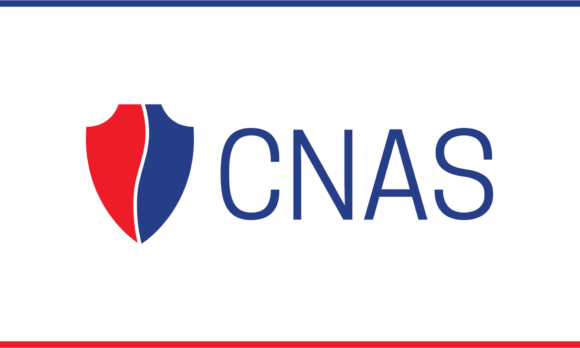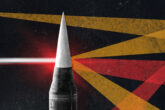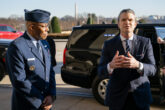December 16, 2020
Sharper: 2020
Analysis from CNAS experts on the most critical challenges for U.S. foreign policy.
From flashpoints in U.S.-Iran and U.S.-China relations to global public health and economic crises, 2020 featured an ever-evolving series of national security challenges. At home, nationwide protests against racial injustice and a polarized presidential election underscored ongoing deep social and political divides. CNAS experts are sharpening the conversation about the issues that defined 2020 and America's competitiveness at home and abroad. Continue reading this edition of Sharper to explore their ideas and recommendations.
Reports
Rising to the China Challenge
Throughout this year, the future of U.S.-China relations remained a critical issue for national security experts. In January, CNAS released a major independent assessment, “Rising to the China Challenge,” as required by Congress in the 2019 National Defense Authorization Act. The report prescribes a comprehensive approach to competition with China and offers nearly 100 specific, actionable policy recommendations across seven critical vectors of American competitiveness. “The United States and China,” the authors wrote, “are locked in strategic competition over the future of the Indo-Pacific—the most populous, dynamic, and consequential region in the world.”
Bolstering American Democracy Against Threats to the 2020 Elections
From August to September, CNAS released weekly commentaries exploring issues related to foreign interference in elections and election security in Europe and the United States. Expert authors examined Europe’s efforts to address foreign interference in its elections, the application of international law to election threats, and Poland’s work to counter disinformation. Shifting to the United States, commentaries from civil society and federal and state government officials addressed voter attitudes about foreign interference, election security, and fostering confidence in the November election.
Rising to the China Challenge
The United States and China are locked in strategic competition over the future of the Indo-Pacific—the most populous, dynamic, and consequential region in the world....
Bolstering American Democracy Against Threats to the 2020 Elections
About this commentary series On August 13, 2020, the Center for a New American Security (CNAS), in collaboration with the University of Pennsylvania’s Center for Ethics and Ru...
The Next Defense Strategy
By statute, the Department of Defense (DoD) must deliver a new National Defense Strategy (NDS) to Congress in 2022. From July to December 2020, CNAS released new papers every week on the tough issues the next NDS should tackle. The goal of this project is to provide intellectual capital to the drafters of the 2022 NDS, focusing specifically on unfinished business from the last several defense strategies and areas where change is necessary but difficult.
Reengaging Iran
Tensions between the United States and Iran rose sharply in 2020. However, the international community may find Iran ready to consider a return to negotiations in 2021. Any U.S. administration seeking diplomatic engagement with Iran, though, will be forced to deal with a number of complicated challenges. In an August CNAS report, experts Ilan Goldenberg, Elisa Catalano Ewers, and Kaleigh Thomas outlined a phased approach for engaging Iran in 2021 that takes into account both regional and nuclear issues.
The Next Defense Strategy
About this commentary series By statute, the Department of Defense (DoD) must deliver a new National Defense Strategy (NDS) to Congress in 2022. And CNAS is here to help. From...
Reengaging Iran
The international community may find Iran ready to consider a return to negotiations in 2021—regardless of the results in November....
Commentaries
The U.S.-China Confrontation Is Not Another Cold War. It’s Something New.
"Cookie-cutter Cold War policies—such as a counter-China military alliance, a geographic containment strategy or all-out economic warfare—are as ill-suited as they are unlikely to succeed," Richard Fontaine and Ely Ratner write in The Washington Post. "Nor is the answer to fan fears of a looming Cold War and urge Washington to ease up on competition with China. Beijing’s ambitions are increasingly global and at odds with the United States, and Washington needs an approach that factors in this new reality."
It's Not Just the WHO: How China Is Moving on the Whole U.N.
According to an essay in POLITICO Magazine by Kristine Lee, "Governments across Asia and the West remain preoccupied with containing the spread of the virus as Covid-19 ravages their economies and populations. But once the crisis eases, the pandemic may provide a moment of reckoning for both Beijing and the U.N."
The Pandemic and the Protests: Necessity and Perception of the National Guard
Expert Nathalie Grogan writes in Policy Perspectives, "Understanding the role of the National Guard and the value it contributes to its communities and our nation's common defense will help to ameliorate some overwhelming fears. The role of the National Guard during the ongoing Black Lives Matter protests has called attention to a component of the armed forces that is often forgotten, though present in American communities. Federal activation over local concerns threatens the perception of the National Guard among these communities."
The U.S.-China confrontation is not another Cold War. It’s something new.
With U.S.-China relations in free fall, the Trump administration’s chief arms control negotiator recently proclaimed that "we know how to win these races and we know how to sp...
It's Not Just the WHO: How China Is Moving on the Whole U.N.
President Donald Trump has decided to halt U.S. funding for the World Health Organization, accusing it of kowtowing to China in the early stages of the coronavirus pandemic by...
The Pandemic and the Protests: Necessity and Perception of the National Guard
COVID-19 has demonstrated the flexibility and dedication of guardsmen and the necessity of adequate funding....
COVID-19 and Illicit Finance in the Cyber Domain
In a CNAS commentary, experts Yaya J. Fanusie and Sam Dorshimer write, "The COVID-19 pandemic has caused major economic disruptions and forced large amounts of financial activity online. Illicit actors are likely to take advantage of the rapid shift to digital transactions and virtual business environments, requiring law enforcement and national security officials to address more cyber-enabled operations."
On Iran, the Next Administration Must Break With the Past
"Only nine months ago, the United States and Iran nearly went to war," Elisa Catalano Ewers, Ilan Goldenberg, and Kaleigh Thomas wrote in Foreign Affairs this October. "Even with simultaneous public health and economic crises dominating today’s agenda, that sobering fact should make Iran an early priority for a new U.S. administration in 2021. In order to relieve tensions, the next U.S. administration will need to engage Iran in renewed diplomacy. But successful diplomacy with Iran will not come easily."
How To Avoid Becoming a Misinformation Superspreader
"At every level of American political life, the 2020 elections are not only testing social media companies’ ability to police their platforms, but social media users’ capacity and willingness to show restraint online," Megan Lamberth, Chris Estep, and Martijn Rasser warn in Inkstick. "Both during and after this fraught set of events, every American must embrace their role as a digital citizen by exercising caution and restraint when creating, consuming, and sharing online content."
COVID-19 and Illicit Finance in the Cyber Domain
The COVID-19 pandemic has caused major economic disruptions and forced large amounts of financial activity online. Illicit actors are likely to take advantage of the rapid shi...
On Iran, the Next Administration Must Break With the Past
The United States can address its discord with Iran and calibrate a smart and clear-eyed policy for the Middle East....
How To Avoid Becoming a Misinformation Superspreader
Social media companies bear immense responsibility for responding to misinformation outbreaks, but they must not — and cannot — go it alone....
In the News
Featuring commentary and analysis by Susanna V. Blume, Andrea Kendall-Taylor, Kayla M. Williams, and Carrie Cordero.
Foreign powers test US defenses amid coronavirus pandemic
U.S. adversaries are probing America's defenses as the world is preoccupied with the fight against the coronavirus pandemic. In the past two weeks, Russia, China, Iran and No...
Unquiet on the Western Front: Why the 74-Year Alliance Between Europe and America Is Falling Apart
When German Foreign Minister Heiko Maas suggested during a June 15 video conference between 28 European Union diplomats and Secretary of State Mike Pompeo that the U.S. and Eu...
Air Force takes steps to clear path for women’s advancement
When Alexandra Jackson joined the West Virginia Air National Guard in 2018, she was looking forward to becoming a pilot with the 167th Airlift Wing, like her father. But at 5-...
Lawmakers question DHS crackdown tactics in protest cities
The military tactics utilized by Homeland Security officers to control protesters in Portland, Oregon, and other cities are being decried by congressional lawmakers and invest...
About the Sharper Series
The CNAS Sharper series features curated analysis and commentary from CNAS experts on the most critical challenges in U.S. foreign policy. From the future of America's relationship with China to the state of U.S. sanctions policy and more, each collection draws on the reports, interviews, and other commentaries produced by experts across the Center to explore how America can strengthen its competitive edge.
Subscribe
Sign up to receive the latest analysis from the CNAS expert community on the most important issues facing America's national security.
Thank you for registering! You will receive a confirmation email shortly. All CNAS events are free, open to the public, and viewable from cnas.org/live.
Stay up-to-date with report releases, events, major updates, and announcements from the Center for a New American Security.
More from CNAS
-
Trump Tariffs: How Will U.S. Plans Reshape the Global Economy?
Donald Trump says he's already decided the tariffs he will impose on countries that export goods to America, including the United Kingdom. Channel 4 hears from Emily Kilcrease...
By Emily Kilcrease
-
Assessing China’s Nuclear Decision-Making
China’s rapid nuclear buildup is raising questions about how the country makes decisions related to nuclear weapons. This policy brief analyzes that trend by presenting three ...
By Jacob Stokes
-
Hegseth Brings the Culture War to Combat
The fundamental challenge of military leadership lies in creating cohesive teams that can work together in an environment of mortal risk and, when called upon to do so, use le...
By Dr. Jason Dempsey
-
Edward Fishman on the Age of Economic Warfare
In the latest episode of the Sanctions Space Podcast, Justine is joined by Edward Fishman, author of Chokepoints: American Power in the Age of Economic Warfare and an adjunct ...
By Edward Fishman
















